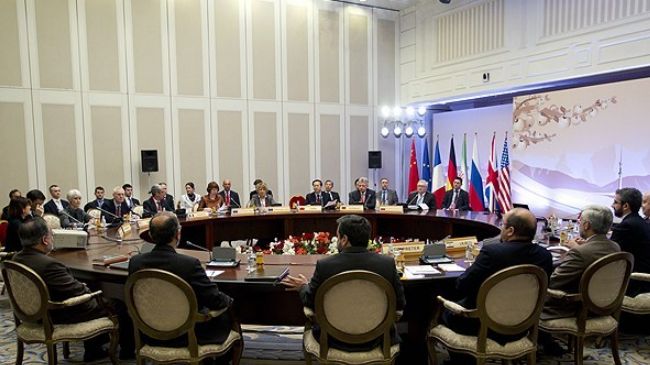Iran and the P5+1 (Britain, China, France, Russia, and the United States plus Germany) have ended on Wednesday the second round of nuclear talks in Kazakhstan’s Almaty.
Iran and the P5+1 (Britain, China, France, Russia, and the United States plus Germany) have ended on Wednesday the second round of nuclear talks in Kazakhstan’s Almaty.
As they announced a resumption of talks in March and then at a higher level in April, Tehran's chief negotiator, Saeed Jalili said the meeting was “more realistic.”
"Some of the points raised in their (the world powers') response were more realistic comparing to what they said in the past," Jalili told reporters after two days of talks.
He said all sides agreed to meet in the same city on April 5-6 after first gathering their nuclear experts for consultations in Istanbul in March.
"It was agreed to convene an expert level meeting in Istanbul on March 18, which would be followed by the 5+1 meeting with Iran on April 5-6 in Almaty," Jalili told reporters.
The world powers offered Iran to ease some of the sanctions imposed against it in exchange for some curbs on uranium enrichment.
Jalili said he viewed the overall tenor of the meeting as "positive."
"We consider these talks as a positive step which could be completed by taking a positive and constructive approach and taking reciprocal steps," he said.
In this context, Iran's Foreign Minister Ali Akbar Salehi said late Wednesday that he was "very optimistic" about the future talks.
"I am happy to say that the outcome of the meeting was positive, that it has been put on the right track and that it is moving in the right direction… So the process has started," Salehi told reporters in Vienna.
“I am very optimistic about the outcome. Eventually the outcome will be in the benefit of the two sides. Things are taking a turning point and I think the Almaty meeting one will be (seen as) a milestone," he said.
"The mere fact that they have decided to hold the next soon, like in a month, is indicative of the fact that they are moving in the right direction and there are positive developments. But things have to be disclosed later and not now," Salehi further stated.
"They are working more on the common points now. The two packages have some common points and they are working on them,” he concluded.
For his part, Russian Deputy Foreign Minister Sergei Ryabkov confirmed earlier today that Iran and world powers will hold their next talks over the Iranian nuclear crisis in Istanbul on March 17-18 at expert level.
"As a result of two days of negotiations, an agreement has been reached for a meeting at expert level in Istanbul on March 17-18," Ryabkov said, quoted by the state RIA-Novosti news agency. The expert-level meetings usually involve senior civil servants ranking below the top negotiators from both sides.